Bookshelf
Bookshelf Archive 2017
Faculty books and productions from 2017.

I Love XXX and Other Plays
by Meng Jinghui
edited and translated by Claire Conceison
Seagull Books
Since premiering his pioneering linguistic experiment I Love XXX in Beijing nearly twenty-five years ago, Meng Jinghui has been credited with revitalizing Chinese theater by popularizing the avant-garde. Mixing high culture with mass culture, his plays address China’s enduring revolutionary nostalgia and current social problems, challenging the artistic status quo from the mainstream rather than the margins.
The collection, chosen by Meng and renowned Chinese theater scholar and translator Claire Conceison, represents the breadth of Meng’s work and illuminates late twentieth- and twenty-first-century creative practices that transcend the conventional category of playwright. I Love XXX includes the title piece, Longing for Worldly Pleasures, The Bedbug, Head Without Tail, and Two Dogs’ Opinions on Life, as well as a DVD featuring selected scenes from each of the plays.
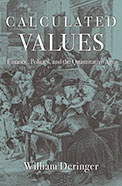
Calculated Values:
Finance, Politics, and the Quantitative Age
by William Deringer
Harvard University Press, January 2018
Modern political culture features a deep-seated faith in the power of numbers to find answers, settle disputes, and explain how the world works. Whether evaluating economic trends, measuring the success of institutions, or divining public opinion, we are told that numbers don’t lie. But numbers have not always been so revered. Calculated Values traces how numbers first gained widespread public authority in one nation, Great Britain.
William Deringer's website
Program in Science, Technology, and Society website

Hidden Atrocities
Japanese Germ Warfare and American Obstruction of Justice at the Tokyo Trial
by Jeanne Guillemin
Columbia University Press, September 2017
In the aftermath of World War II, the Allied intent to bring Axis crimes to light led to both the Nuremberg trials and their counterpart in Tokyo, the International Military Tribunal of the Far East. Yet the Tokyo Trial failed to prosecute imperial Japanese leaders for the worst of war crimes: inhumane medical experimentation, including vivisection and open-air pathogen and chemical tests, which rivaled Nazi atrocities, as well as mass attacks using plague, anthrax, and cholera that killed thousands of Chinese civilians. Jeanne Guillemin, senior fellow in the MIT Security Studies Program, goes behind the scenes at the trial to reveal the American obstruction that denied justice to Japan’s victims.
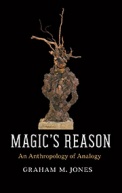
Magic's Reason
An Anthropology of Analogy
by Graham M. Jones
University of Chicago Press, 2018
In Magic’s Reason, Graham M. Jones tells the entwined stories of anthropology and entertainment magic. The two pursuits are not as separate as they may seem at first. As Jones shows, they not only matured around the same time, but they also shared mutually reinforcing stances toward modernity and rationality. It is no historical accident, for example, that colonial ethnographers drew analogies between Western magicians and native ritual performers, who, in their view, hoodwinked gullible people into believing their sleight of hand was divine.
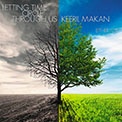
Letting Time Circle Through Us
by Keeril Makan
New World Records, July 2017
Keeril Makan (b. 1972) composed his longest instrumental work to date, Letting Time Circle Through Us (2013), on commission for the New York City-based ensemble Either/Or, with whose musicians Makan has worked intimately over the course of many years and on several projects. The larger trajectory of Makan's musical explorations has not been a linear one, so this close collaboration was invaluable in arriving at the final recorded realization of the project.
Either/Or is an experimental music ensemble comprised of Russell Greenberg, percussion; David Shively, cimbalom; Dan Lippel, acoustic guitar; Taka Kigawa, piano; Jennifer Choi, violin; and John Popham, cello.
Review at the Boston Globe
Keeril Makan's website
Either/Or website
MIT Music
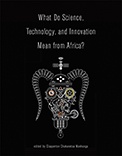
What Do Science, Technology, and Innovation Mean from Africa?
edited by Clapperton Chakanetsa Mavhunga
MIT Press, June 2017
In the STI literature, Africa has often been regarded as a recipient of science, technology, and innovation rather than a maker of them. In this book, scholars from a range of disciplines show that STI in Africa is not merely the product of “technology transfer” from elsewhere but the working of African knowledge. Their contributions focus on African ways of looking, meaning-making, and creating. The chapter authors see Africans as intellectual agents whose perspectives constitute authoritative knowledge and whose strategic deployment of both endogenous and inbound things represents an African-centered notion of STI. “Things do not (always) mean the same from everywhere,” observes Clapperton Chakanetsa Mavhunga, the volume’s editor. Western, colonialist definitions of STI are not universalizable.
Contributors include Geri Augusto, Shadreck Chirikure, Chux Daniels, Ron Eglash, Ellen Foster, Garrick E. Louis, D. A. Masolo, Clapperton Chakanetsa Mavhunga, Neda Nazemi, Toluwalogo Odumosu, Katrien Pype, and Scott Remer.
Clapperton Chakanetsa Mavhunga's website
Review of the volume at Science
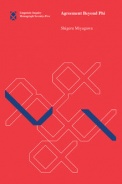
Agreement Beyond Phi
by Shigeru Miyagawa
MIT Press, March 2017
Much attention in theoretical linguistics in the generative and Minimalist traditions is concerned with issues directly or indirectly related to movement. The EPP (extended projection principle), introduced by Chomsky in 1981, appeared to coincide with morphological agreement, and agreement came to play a central role as the driver of movement and other narrow-syntax operations. In this book, Shigeru Miyagawa continues his investigation into a computational equivalent for agreement in agreementless languages such as Japanese.
Miyagawa extends his theory of Strong Uniformity, introduced in his earlier book, Why Agree? Why Move? Unifying Agreement-Based and Discourse-Configurational Languages (MIT Press, 2009). He argues that agreement and agreementless languages are unified under an expanded view of grammatical features including both phi-features and discourse configurational features of topic and focus. He looks at various combinations of these two grammatical features across a number of languages and phenomena, including allocutive agreement, root phenomena, topicalization, “why” questions, and case alternation.
Shigeru Miyagawa's website
MIT Linguistics
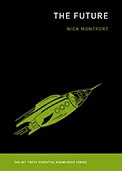
The Future
by Nick Montfort
MIT Press, November 2017
The future is like an unwritten book. It is not something we see in a crystal ball, or can only hope to predict, like the weather. In this volume of the MIT Press’s Essential Knowledge series, Nick Montfort argues that the future is something to be made, not predicted.
Montfort offers what he considers essential knowledge about the future, as seen in the work of writers, artists, inventors, and designers (mainly in Western culture) who developed and described the core components of the futures they envisioned.
Nick Montfort's website
MIT Comparative Media Studies / Writing

Tokyo Boogie-Woogie: Japan's Pop Era and Its Discontents
by Hiromu Nagahara
Harvard University Press, April 2017
In this first English-language history of the origins and impact of the Japanese pop music industry, Hiromu Nagahara connects the rise of mass entertainment, epitomized by ryūkōka (“popular songs”), with Japan’s transformation into a middle-class society in the years after World War II.
With the arrival of major international recording companies like Columbia and Victor in the 1920s, Japan’s pop music scene soon grew into a full-fledged culture industry that reached out to an avid consumer base through radio, cinema, and other media. The stream of songs that poured forth over the next four decades represented something new in the nation’s cultural landscape. Emerging during some of the most volatile decades in Japan’s history, popular songs struck a deep chord in Japanese society, gaining a devoted following but also galvanizing a vociferous band of opponents. A range of critics—intellectuals, journalists, government officials, self-appointed arbiters of taste—engaged in contentious debates on the merits of pop music. Many regarded it as a scandal, evidence of an increasingly debased and Americanized culture. For others, popular songs represented liberation from the oppressive political climate of the war years.
Tokyo Boogie-Woogie is a tale of competing cultural dynamics coming to a head just as Japan’s traditionally hierarchical society was shifting toward middle-class democracy. The pop soundscape of these years became the audible symbol of changing times.
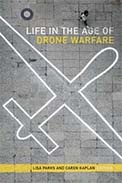
Life in the Age of Drone Warfare
co-edited by Lisa Parks and Caren Kaplan
Duke University Press, October 2017
This volume's contributors offer a new critical language through which to explore and assess the historical, juridical, geopolitical, and cultural dimensions of drone technology and warfare. They show how drones generate particular ways of visualizing the spaces and targets of war while acting as tools to exercise state power. Essays include discussions of the legal justifications of extrajudicial killings and how US drone strikes in the Horn of Africa impact life on the ground, as well as a personal narrative of a former drone operator.
Read an excerpt from the book at N+1
Lisa Parks's website
CMS/W website
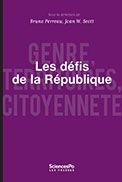
Les Défis de la République: Genre, Territoires, Citoyenneté
co-edited by Bruno Perreau, and Joan W. Scott
Presses de Sciences Po, January 2017
How does political change occur? Les Défis de la République brings together eight distinguished contributors who assess the impact of demands for voting rights for non-citizens, campaigns for the rights of gays and lesbians, and for equal access to political office for women and men. As a point of departure, the book considers the career of Françoise Gaspard—a scholar, activist and political leader—who launched the idea of political parity in France, authored numerous policy proposals to implement gender equality in European cities, and helped rewrite constitutions throughout the world (notably in Rwanda and Tunisia) as the French delegate to the United Nations Commission on the Status of Women. At this moment focused on the coming presidential election in France, Les Défis de la République intervenes in an important discussion about the nature of change, and argues for incrementalism in the face of conservative backlash.
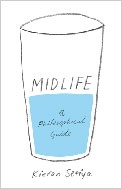
Midlife: A Philosophical Guide
by Kieran Setiya
Princeton University Press, October 2017
How can you reconcile yourself with the lives you will never lead, with possibilities foreclosed, and with nostalgia for lost youth? How can you accept the failings of the past, the sense of futility in the tasks that consume the present, and the prospect of death that blights the future? In this self-help book with a difference, Kieran Setiya confronts the inevitable challenges of adulthood and middle age, showing how philosophy can help you thrive.
Ranging from Aristotle, Schopenhauer, and John Stuart Mill to Virginia Woolf and Simone de Beauvoir, as well as drawing on Setiya’s own experience, Midlife combines imaginative ideas, surprising insights, and practical advice. Writing with wisdom and wit, Setiya makes a wry but passionate case for philosophy as a guide to life.
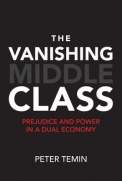
The Vanishing Middle Class: Prejudice and Power in a Dual Economy
by Peter Temin
MIT Press, March 2017
The United States is becoming a nation of rich and poor, with few families in the middle. In this book, MIT economist Peter Temin offers an illuminating way to look at the vanishing middle class. Temin argues that American history and politics, particularly slavery and its aftermath, play an important part in the widening gap between rich and poor. Temin employs a well-known, simple model of a dual economy to examine the dynamics of the rich/poor divide in America, and outlines ways to work toward greater equality so that America will no longer have one economy for the rich and one for the poor.
Many poorer Americans live in conditions resembling those of a developing country—substandard education, dilapidated housing, and few stable employment opportunities. And although almost half of black Americans are poor, most poor people are not black. Conservative white politicians still appeal to the racism of poor white voters to get support for policies that harm low-income people as a whole, casting recipients of social programs as the Other—black, Latino, not like "us." Politicians also use mass incarceration as a tool to keep black and Latino Americans from participating fully in society. Money goes to a vast entrenched prison system rather than to education. In the dual justice system, the rich pay fines and the poor go to jail.